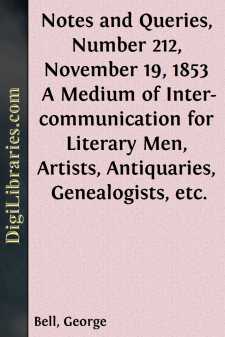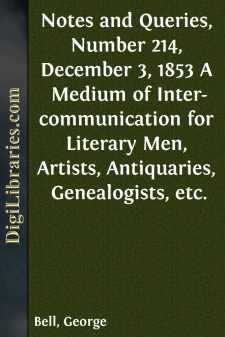Categories
- Antiques & Collectibles 13
- Architecture 36
- Art 48
- Bibles 22
- Biography & Autobiography 813
- Body, Mind & Spirit 142
- Business & Economics 28
- Children's Books 17
- Children's Fiction 14
- Computers 4
- Cooking 94
- Crafts & Hobbies 4
- Drama 346
- Education 46
- Family & Relationships 57
- Fiction 11829
- Games 19
- Gardening 17
- Health & Fitness 34
- History 1377
- House & Home 1
- Humor 147
- Juvenile Fiction 1873
- Juvenile Nonfiction 202
- Language Arts & Disciplines 88
- Law 16
- Literary Collections 686
- Literary Criticism 179
- Mathematics 13
- Medical 41
- Music 40
- Nature 179
- Non-Classifiable 1768
- Performing Arts 7
- Periodicals 1453
- Philosophy 64
- Photography 2
- Poetry 896
- Political Science 203
- Psychology 42
- Reference 154
- Religion 513
- Science 126
- Self-Help 84
- Social Science 81
- Sports & Recreation 34
- Study Aids 3
- Technology & Engineering 59
- Transportation 23
- Travel 463
- True Crime 29
Notes and Queries, Number 234, April 22, 1854 A Medium of Inter-communication for Literary Men, Artists, Antiquaries, Genealogists, etc.
by: George Bell
Categories:
Description:
Excerpt
Minor Notes.
Tippet.—The origin of words signifying articles of dress would be a curious subject for investigation. Tippet is derived by Barclay from the Saxon tæppet; but I find the following passage in Captain Erskine's Journal of his recent Cruise in the Western Pacific, p. 36. He is writing of the dress of the women at the village of Feleasan, in the Samoan Islands:
"And occasionally a garment (tiputa) resembling a small poncho, with a slit for the head, hanging so as decently to conceal the bosom."
May we not trace here both the article and the name?
W. T. M.
Ridings and Chaffings.—A singular custom prevails in South Nottinghamshire and North Leicestershire. When a husband, forgetting his solemn vow to love, honour, and keep his wife, has had recourse to physical force and beaten her, the rustics get up what is called "a riding." A cart is drawn through the village, having in it two persons dressed so as to resemble the woman and her master. A dialogue, representing the quarrel, is carried on, and a supposed representation of the beating is inflicted. This performance is always specially enacted before the offender's door.
Another, and perhaps less objectionable, mode of shaming men out of a brutal and an unmanly practice, is to empty a sack of chaff at the offender's door,—an intimation, I suppose, that thrashing has been "done within." Perhaps this latter custom gave rise to the term "chaffing." Thirty years ago both these customs were very common in this locality; but, either from an improved tone of morality, or from the comparative rarity of the offence that led to them, both ridings and chaffings are now of very rare occurrence.
Can any reader of "N. & Q." inform me whether these customs have prevailed, or still prevail, in other counties?
Thomas R. Potter.
Wymeswold, Leicestershire.
Henry of Huntingdon's "Letter to Walter."—Mr. Forester (Bohn's Antiquarian Library) decides, in opposition to Wharton and Hardy, that this epistle was written in 1135, during the lifetime of Henry I., and there can be no doubt that the passage he quotes bears him out in this; but it is not less certain that, whether owing to the death of the friend to whom the letter was addressed, or from a wholesome fear of the resentment of that king who is so roughly handled in it, the publication was deferred long enough for the author to reinforce by a few "modern instances" of more recent date, the "wise saws" which are so plentifully diffused through it: for instance, at p. 313. he mentions the death of Louis VI. of France, which occurred 1st August, 1137, twenty months after the death of Henry. And it is probable that a closer search than I have the means of making, would reveal other instances of a like nature, though this is sufficient by itself.
After all, is it not possible that the worthy archdeacon (like Bolingbroke at a future day) may have antedated his letter to give himself an air of boldness and independence beyond what he really possessed? This would account not only for the references to later occurrences, but for the accurate fulfilment of the prophecy which he quotes about the duration of the reign of Henry I....












